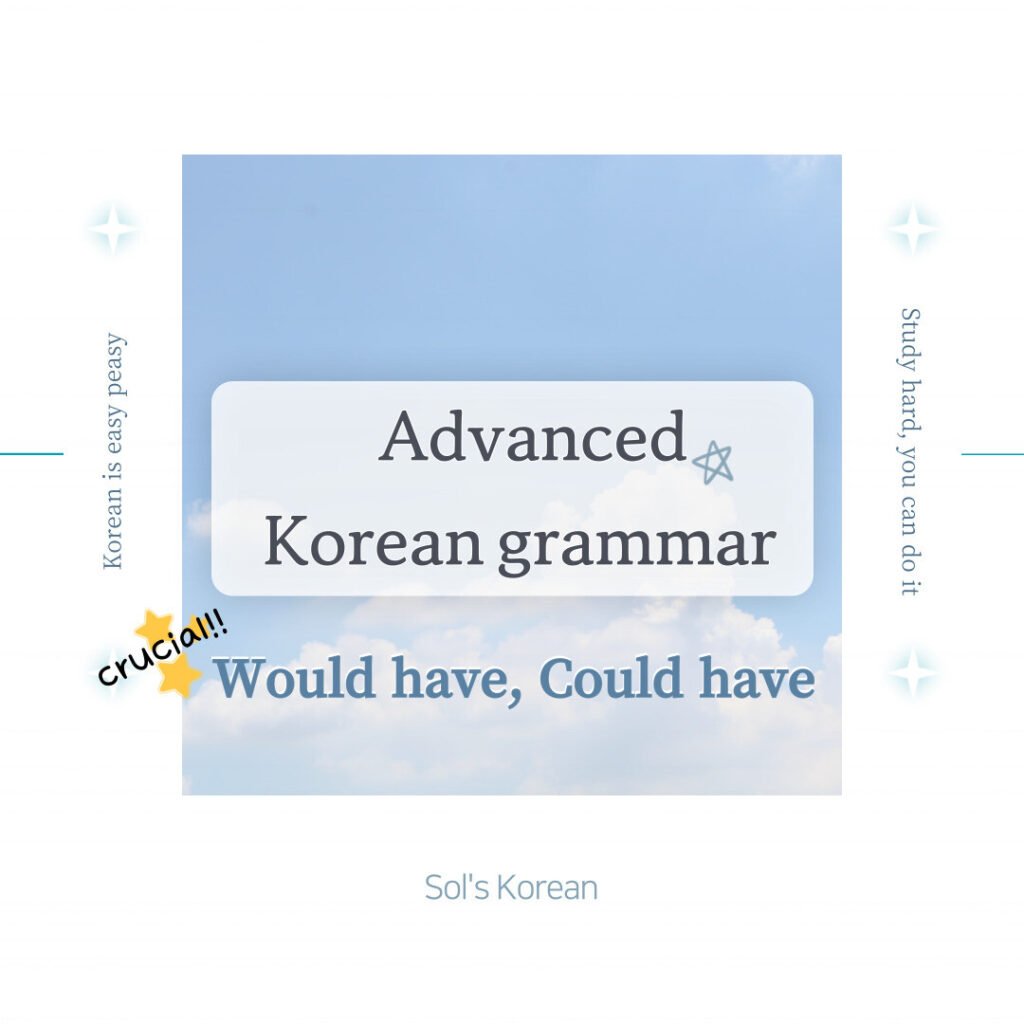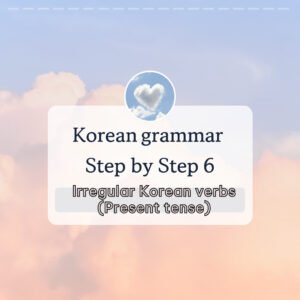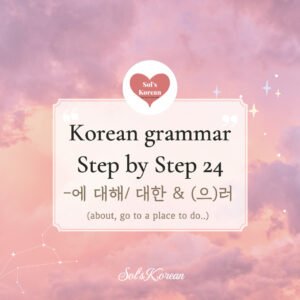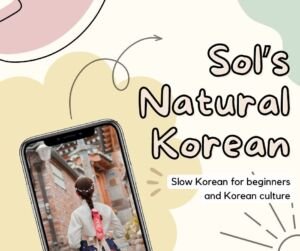Let’s master “Would have” & “Could have in Korean”! Just memorize this !
Today, we are going to MASTER Would have / Could have in Korean!
If you are studying this grammar, you’re almost at the level of mastering Korean grammar! 😸
There are actually various ways to express this grammar, but I’ve discovered a rule that makes it easy for you to remember 🙂
Let’s study together and master it in today’s lesson!
Let’s grasp the concept of grammar
To express ‘would’ve,’ you can simply add 을 텐데 to past-tense verbs or adjectives!
Would have : Past tense of verbs/adjectives + 을 텐데
공부했어요(Past tense, study) + 을 텐데 –> 공부했을 텐데(Would’ve studied)
갔어요(Past tense, go) + 을 텐데 -> 갔을 텐데(Would’ve gone)
찾았어요(Past tense, find) + 을 텐데 -> 찾았을 텐데(Would’ve found)
읽었어요(Past tense, read) + 을 텐데 -> 읽었을 텐데(Would’ve read)
운전했어요(Past tense, drive) + 을 텐데 – > 운전했을 텐데(Would’ve driven)
Examples✨
He could’ve succeeded if he hadn’t given up
너한테 전화했을 텐데, 휴대폰을 잃어버렸었어. (전화했었을 텐데 also works!)
She would have come if she wasn’t busy.
안 바빴으면 파티에 왔을 텐데. (왔었을 텐데 🙆♀️)
I would have bought it if it wasn’t so expensive.
너무 안 비쌌으면 샀을 텐데 (샀었을 텐데 🙆♀️)
I would have loved you forever
너를 평생 사랑했었을 텐데…
To express “could have,” we can simply add “을 수 있었어요” to “would have”!
Reminder: 을 수 있었어요 is the past tense of can(ㄹ/을 수 있어요.)
* I could buy thanks to you / I was able to buy thanks to you : 너 덕분에 살 수 있었어.
Could have : Verb + ㄹ/을 수 있었어요 + 을 텐데
살(buy) 수 있었어요 + 을 텐데 -> 살 수 있었을 텐데 (I could’ve bought)
전화할(call) 수 있었어요+ 을 텐데-> 전화 할 수 있었을 텐데(I could’ve called)
도착할(arrive) 수 있었어요 + 을 텐데 -> 도착할 수 있었을 텐데(we could’ve arrived)
찾을(find) 수 있었어요 + 을 텐데 -> 찾을 수 있었을 텐데(She could’ve found)
You can simply memorize as “Could have : ㄹ/을 수 있었을 텐데”
Examples✨
He could’ve succeeded if he hadn’t given up.
포기하지 않았으면 성공할 수 있었을 텐데…
We could’ve gone to the beach if it hadn’t rained.
비가 안 왔으면 해변에 갈 수 있었을 텐데
I could’ve helped you, but you didn’t ask.
너가 부탁했으면 도와줄 수 있었을 텐데 (근데 안 물어 봤잖아
Today, we are going to MASTER Would have / Could have in Korean!
If you are studying this grammar, you’re almost at the level of mastering Korean grammar! 😸
There are actually various ways to express this grammar, but I’ve discovered a rule that makes it easy for you to remember 🙂
Let’s study together and master it in today’s lesson!
Let’s grasp the concept of grammar
To express ‘would’ve,’ you can simply add 을 텐데 to past-tense verbs or adjectives!
Would have : Past tense of verbs/adjectives + 을 텐데
공부했어요(Past tense, study) + 을 텐데 -> 공부했을 텐데(Would’ve studied)
갔어요(Past tense, go) + 을 텐데 -> 갔을 텐데(Would’ve gone)
찾았어요(Past tense, find) + 을 텐데 -> 찾았을 텐데(Would’ve found)
읽었어요(Past tense, read) + 을 텐데 -> 읽었을 텐데(Would’ve read)
운전했어요(Past tense, drive) + 을 텐데 – > 운전했을 텐데(Would’ve driven)
Examples✨
I would have called you, but I lost my phone.
너한테 전화했을 텐데, 휴대폰을 잃어버렸었어. (전화했었을 텐데 also works!)
She would have come if she wasn’t busy.
안 바빴으면 파티에 왔을 텐데. (왔었을 텐데 🙆♀️)
I would have bought it if it wasn’t so expensive.
너무 안 비쌌으면 샀을 텐데 (샀었을 텐데 🙆♀️)
I would have loved you forever
너를 평생 사랑했었을 텐데…
To express “could have,” we can simply add “을 수 있었어요” to “would have”!
Reminder: 을 수 있었어요 is the past tense of can(ㄹ/을 수 있어요.)
* I could buy thanks to you / I was able to buy thanks to you : 너 덕분에 살 수 있었어.
Could have : Verb + ㄹ/을 수 있었어요 + 을 텐데
살(buy) 수 있었어요 + 을 텐데 -> 살 수 있었을 텐데 (I could’ve bought)
전화할(call) 수 있었어요+ 을 텐데-> 전화 할 수 있었을 텐데(I could’ve called)
도착할(arrive) 수 있었어요 + 을 텐데 -> 도착할 수 있었을 텐데(we could’ve arrived)
찾을(find) 수 있었어요 + 을 텐데 -> 찾을 수 있었을 텐데(She could’ve found)
You can simply memorize as “Could have : ㄹ/을 수 있었을 텐데”
Examples✨
He could’ve succeeded if he hadn’t given up.
포기하지 않았으면 성공할 수 있었을 텐데…
We could’ve gone to the beach if it hadn’t rained.
비가 안 왔으면 해변에 갈 수 있었을 텐데
I could’ve helped you, but you didn’t ask.
너가 부탁했으면 도와줄 수 있었을 텐데 (근데 안 물어 봤잖아!)
I could’ve forgiven you if you’d apologized sincerely.
진심으로 사과했으면 용서할 수도 있었을 텐데
Adding “도” after “수” (as in “수도”) introduces a sense of possibility or uncertainty, which often translates as “might” in English. This subtle difference can be seen in examples like:
I can eat: 먹을 수 있어요
I might eat: 먹을 수도 있어요
This pattern can also apply to expressions of past potential:
더 일찍 도착할 수 있었을 텐데
This translates to “I could have arrived earlier,” emphasizing that the speaker had the ability or opportunity to arrive earlier, but didn’t for some reason.
더 일찍 도착할 수도 있었을 텐데
This translates to “I could have possibly arrived earlier,” “might have arrived earlier. ” or “There was a chance I could have arrived earlier.” Here, “수도” introduces a bit of uncertainty, implying that an earlier arrival was a possibility.
* Additional info*
The difference between ㄹ/을 수 있을 텐데 (present tense) and ㄹ/을 수 있었을 텐데 (past tense).
Present Possibility (ㄹ/을 수 있을 텐데)
Focuses on a possibility that could happen now or in the future, but hasn’t happened yet.
Less emotional, just hypothetical.
내가 지금 시간이 있으면 그 일을 할 수 있을 텐데.
(If I had time now, I would be able to do that job.)
→ This expresses a present possibility. It’s talking about what could happen right now if you had time.
내가 돈이 많으면 한국에 살 수 있을 텐데
(If i had a lot of money, I’d be able to live in Korea.)
Past Possibility (ㄹ/을 수 있었을 텐데)
Focuses on a missed opportunity or regret about something that could have happened in the past, but didn’t. It carries a nuance of regret, longing, or disappointment.
내가 그때 시간이 있었으면 그 일을 할 수 있었을 텐데.
(If I had had time back then, I could have done that job.)
→ This implies that in the past, you had the ability to do the job, but you didn’t. There is a missed opportunity or regret.
내가 돈이 많으면 살 수 있었을 텐데
(I would have been able to live in Korea. = I could have been)
* To express “would have,” we can use the simple future tense as well, “을 거예요“
너는 콘서트를 정말 즐겼을 거야
“을 거야” is commonly used to express a guess or assumption about what would have happened. It’s a straightforward way to say “you would have,” without implying any extra nuance or emotion.
(is often used for neutral assumptions about past or present situations, where you’re making a guess based on logic or what you know about the person. It doesn’t express any disappointment or missed opportunity—just your belief about the likely outcome.)
너는 콘서트를 정말 즐겼을 텐데
“을 텐데” adds a bit more nuance. It often implies a sense of expectation or regret about the missed opportunity. This form is frequently used in self-talk or when reflecting on a missed opportunity, implying a sense of “it’s too bad” or “if only.”
✨ Let’s take a look at examples! ✨
비가 안 왔으면, 우리는 공원에 갔었을 거예요.
“If it hadn’t rained, we would have gone to the park.”
The sentence assumes a past event that didn’t happen because of the rain. The speaker is stating that going to the park was a likely possibility, but because it rained, it didn’t happen.
그 영화를 봤다면, 재미있었을 거예요.
“If you had watched the movie, you would have enjoyed it.”
-> “재미있었을 거예요” expresses a strong assumption or likelihood about what would have happened in the past. The speaker is confident that if the person had watched the movie, the experience would have been enjoyable.
시간이 더 있었으면, 더 많이 배웠(었)을 거예요. 정말 좋았을 텐데요.
“If we had had more time, we would have learned more. It would have been really great.”
-> Using 배웠을 거예요 expresses a strong assumption that more learning would have taken place if more time had been available. “정말 좋았을 텐데요” conveys a sense of longing and regret, as the speaker reflects on the missed opportunity.
내가 그걸 알았더라면, 도와줬을 거예요. 마음이 아프네요.
“If I had known that, I would have helped. It breaks my heart.”
-> It implies the speaker is fairly sure that they would have helped if they had known. However, there is no absolute certainty because it’s still a hypothetical scenario.
🌸In Summary 🌸
Would Have
Past tense verb/adjective + 을 텐데 : Adds a nuance of regret, disappointment, or bittersweet longing (아쉬움).
Past tense verb/adjective + 을 거예요 : Expresses “would have” without the nuance of 아쉬움.
Could Have
ㄹ/을 수 있었을 텐데 : Implies a higher likelihood that the outcome was possible.
ㄹ/을 수도 있었을 텐데 : Implies a lower likelihood, meaning “might have.”
✨✨Practice time!! ✨✨
(1) If you had been there, you would have really enjoyed it.
(2)If we had left earlier, we could have arrived sooner.
(3) If I had finished that work a bit faster, the weekend would have been more relaxing.
(4) If I had known back then, I would have helped you.
(5) If I had had time back then, I could have helped you.
(6) If I had that much money, I could buy a new car.
(7) If it hadn’t rained, we would have gone for a walk.
(8) If the weather had been nice, we could have stayed at the beach all day.
(9) If I had more time, I could finish this project.
(10) If my friends hadn’t come, I would have felt lonely.
(11) You could have won if you hadn’t made that mistake.
(12) If you had read that book, you would have really liked it.
(13) We could have finished earlier if we hadn’t taken a break.
(14) If I had known about the event, I could join.
(15) If I had known the movie would be this popular, I would have watched it too.
✨Here are the answers !!✨
(1) If you had been there, you would have really enjoyed it.
네가 거기에 있었다면 정말 즐거웠을 텐데. — too bad you weren’t!
네가 거기에 있었다면 정말 즐거웠을 거야.
* You can use 있었다면, 있었으면, 있었었더라면, 있었었으면 (ㅋㅋㅋ) as well…!!
(2) If we had left earlier, we could have arrived sooner.
우리가 더 일찍 출발했으면 더 빨리 도착할 수(도) 있었을 텐데.
* 했더라면, 했었으면, 했다면, 했었었다면, 했었더라면 everything works… 🙂 stick with the one you like the most!!!
(3) If I had finished that work a bit faster, the weekend would have been more relaxing.
그 일을 조금만 더 빨리 끝냈다면 주말이 더 편했을 텐데. — too bad I didn’t.
그 일을 조금만 더 빨리 끝냈다면 주말이 더 편했을 거야.
* 끝냈더라면, 끝냈었다면, 끝냈었더라면, 끝냈었었다면,,, all work!
(4) If I had known back then, I would have helped you.
내가 그때 알았다면 도와줬을 텐데. — it’s unfortunate I didn’t know.
내가 그때 알았다면 도와줬을 거야.
(5) If I had had time back then, I could have helped you.
내가 그때 시간이 있었으면 널 도와줄 수(도) 있었을 텐데.
(6) If I had that much money, I could buy a new car.
내가 그만큼 돈이 있으면, 새 차를 살 수(도) 있을 텐데. (Hypothetical/Present Possibility!!)
(7) If it hadn’t rained, we would have gone for a walk.
비가 안 왔으면, 산책을 했을 텐데. — it’s disappointing it rained.
비가 안 왔다면, 산책을 했을 거야.
(8) If the weather had been nice, we could have stayed at the beach all day.
날씨가 좋았더라면, 해변에서 하루 종일 있을 수(도) 있었을 텐데.
(9) If I had more time, I could finish this project.
시간이 더 있으면, 이 프로젝트를 다 끝낼 수(도) 있을 텐데요. (Hypothetical/Present Possibility)
(10) If my friends hadn’t come, I would have felt lonely.
친구들이 오지 않았다면 정말 외로웠을 거예요.
친구들이 오지 않았다면 정말 외로웠을 텐데, (I’m glad they did! 와서 다행이에요)
(11) You could have won if you hadn’t made that mistake.
그 실수를 안 했으면 이길 수(도) 있었을텐데…
(12) If you had read that book, you would have really liked it.
네가 그 책을 읽었으면 정말 좋았을 거예요.
네가 그 책을 읽었으면 정말 좋았을 텐데. (아쉬움!)
(13) We could have finished earlier if we hadn’t taken a break.
쉬지 않았으면 더 일찍 끝날 수(도) 있었을텐데..
(14) If I had known about the event, I could join.
그 이벤트에 대해 알았더라면 갔을 텐데! (Hypothetical/Present Possibility)
(15) If I had known the movie would be this popular, I would have watched it too.
그 영화가 이렇게 인기가 많을 줄 알았다면, 나도 봤을 거예요.
그 영화가 이렇게 인기가 많을 줄 알았다면, 나도 봤을 텐데. (아쉬움!)
Goooood job guys!!! Actually, organizing this grammar was hard for me too, haha. 😂😂
Since these aren’t easy grammar points, make sure to practice a lot!!
In fact, there are several ways to express ‘would have’ and ‘could have.’ It can get overwhelming, and the more you study grammar, the more confusing it can get, it’s best to memorize the one that feels most comfortable for you and stick with it!!!
(When I was studying Spanish, there were more than five ways to say ‘would have.’ It was so many that I got confused every time I had to use it. So, I decided to just memorize one and stick with it, and after that, speaking became much easier. I recommend that method to you all. But if you’re ambitious, feel free to study them all!)

If you want to improve your listening skills, check it out here!
Come visit my Youtube channel as well!




